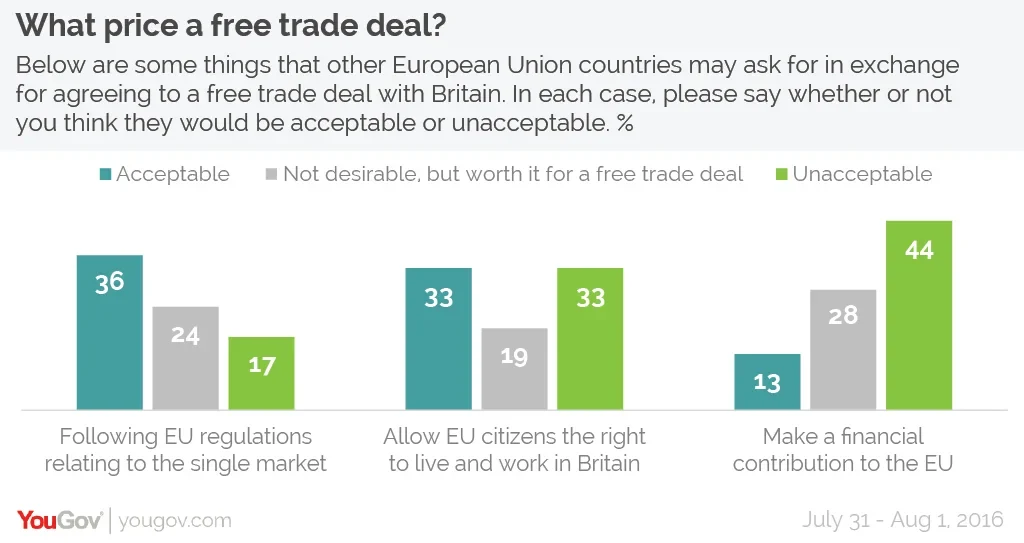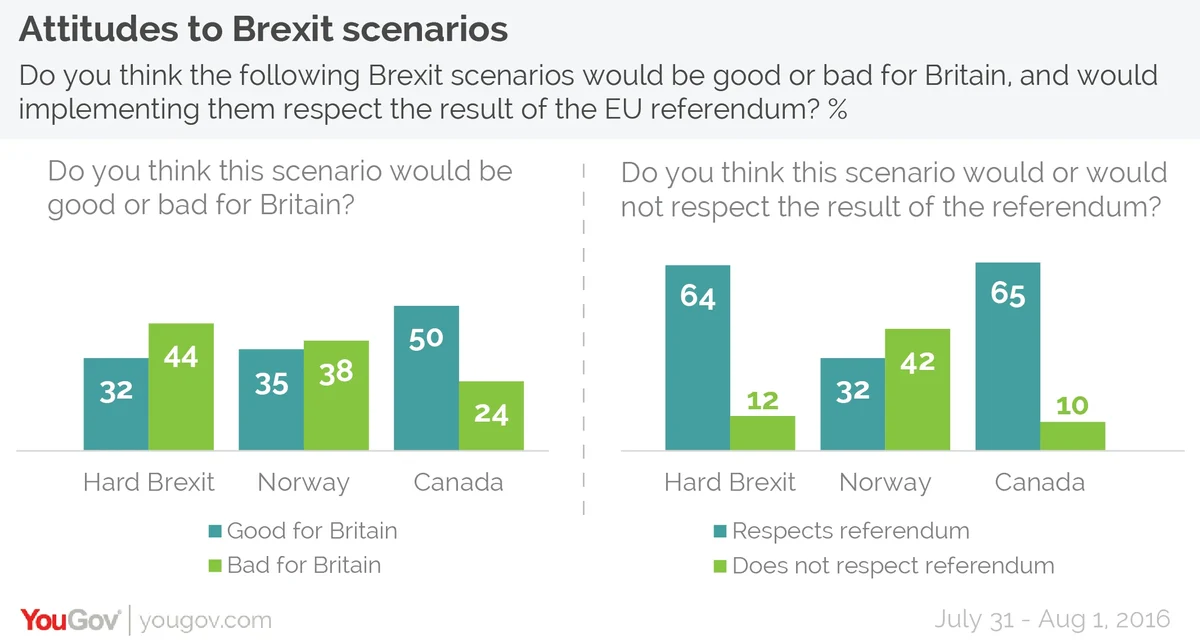A limited free trade deal with the EU without any financial contribution or freedom of movement is people's preferred choice for Brexit
In June Britain voted to leave the European Union, and when Theresa May took over as Prime Minister she was clear that Brexit meant Brexit. The question is, exactly what sort of Brexit? Amidst all the discussion of different types of deal, of whether Britain should swap freedom of movement for free trade, exactly what do the public want the government to do? What would be seen as good for Britain, and what would be seen as betraying the result of the referendum?
To start with, a large majority of people think that the government should follow the result of the referendum and leave: by 69% to 22% the public think that Brexit does need to mean Brexit. The overwhelming majority of people who voted for Britain to leave the European Union obviously think that the government should go ahead and leave. The 48% who voted to stay are more evenly split – 49% of Remain voters think the government should bow to public opinion and leave the European Union, 45% think that the government should ignore the result or seek to overturn it in the second referendum. Among the wider public there is limited appetite for a second vote – by 56% to 34% people think it would unacceptable for the next government to hold a second referendum.
Asked about the type of Brexit they’d like to see, people who voted for Britain to remain in the European Union are largely in favour of as close as possible a relationship in the future. People who voted to leave are generally in favour of a new relationship with the European Union that centres only on free trade.
There is little support for a so-called “hard Brexit” - even among Leave voters. Only 10% of people think Britain should leave the EU completely and not seek any sort of formal trading relationship and only 22% think we should drop out of the EU as rapidly as possible. The vast majority want a more gradual and negotiated exit. 31% think Britain should leave over the suggested two year timescale, 33% think that it would be fine to take even longer than this over our exit.

A large majority of Britons, both Remain and Leave voters, think it is important that Britain secures free trade with the remainder of the European Union once we leave. Opinions divide when it comes to what people think the British government should be willing to agree to in exchange for free trade.
- 60% of people think Britain following EU regulations on the single market (such as common product standards) would either be fine (36%) or would be a price worth paying for free trade (24%)
- Allowing EU citizens the right to live and work in Britain is seen as acceptable by 52% of people (33% think it would be fine, 19% think it would be undesirable but a price worth paying). 33% think that allowing EU citizens to live and work here would be unacceptable, and it would be better not to have a deal at all than accept it
- A financial contribution to the European Union would be a bigger deal-breaker. 41% think it would either be fine (13%) or would be a price worth paying (28%), 44% think it would be better to have no deal at all than agree to contribute financially.
Of course, how the public would actually react to these would end up depending on degree and how they are presented (what sort of financial contribution? What limits, if any, would there be on immigration?), but they provide an idea of how the public are likely to respond to any negotiations.

Another way of looking at it would be the broad type of deal. We also presented respondents with three types of deal that Britain might secure with the rest of the EU (respondents were presented with the deals in a random order).
- The first was a hard Brexit – Britain leaving the EU and not having any sort of deal with the EU. We wouldn’t have to pay any fee or follow their rules, wouldn’t have to allow EU citizens any right to come here… but we would not have tariff-free or barrier-free access to EU markets. By 64% to 12% the public think this would respect the result of the referendum, but by 44% to 32% they think it wouldn’t be good for Britain.
- The second was a Norway style deal – Britain leaving the EU and joining EFTA instead, guaranteeing us full market access in exchange for giving EU citizens the right to live and work in the UK, making a financial contribution to the EU and following EU regulation in many areas (but not fisheries, agriculture or home affairs). This was viewed a little less negatively (35% thought it would be good for the country, 38% did not), it was not seen as respecting the result of the referendum – only 32% thought it would be respecting the result, 42% did not. 57% of Leave voters think such an outcome would not be respecting the referendum vote.
- The third was a Canada style deal. Britain would have a limited free trade deal with the EU – there are no tariffs on goods, but service sectors like financial services would not be able export freely to the EU. Britain would make no financial contribution to the EU and EU citizens would have no right to live or work here. This was seen as both a positive outcome for Britain (by 50% to 24%) and to respect the outcome of the by vote (by 65% to 10%).
It is important to note that we are at a very early stage in both the Brexit process and public awareness of the Brexit process and things may easily change once this becomes a more active political debate and the type of deal on offer begins to become clear. There are advantages and disadvantages to the possible outcomes that voters won’t yet be familiar with, and we don’t yet really know what sort of deals will be on the table. Equally, given the complexities of Brexit many people’s opinions will be strongly influenced by how the potential deals come across in the media and in the wider public debate.
However as a starting point it looks as if an EFTA type deal would not be seen as a good deal by the public and, perhaps more importantly, would not be seen as respecting the result of the referendum, particularly by those who voted to Leave. A deal based only on trade, even if that trade is limited, looks as if it would be an easier sell to the public – whether or not is would be the best deal for the country is a different question.
Photo: PA










